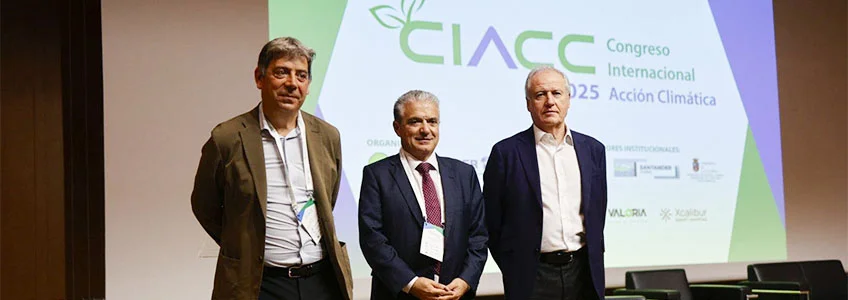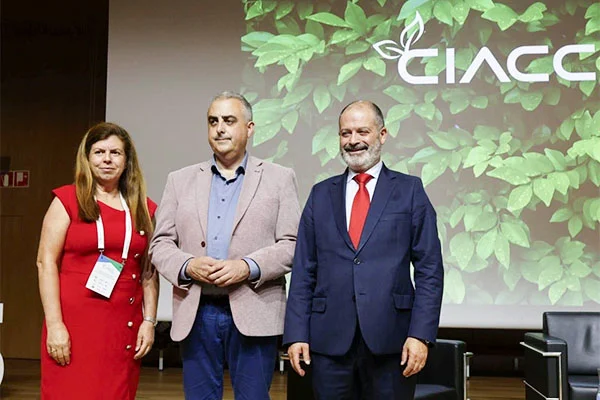The 4th International Climate Action Congress (CIACC 2025), organized by the Fundación Universitaria Iberoamericana (Ibero-American University Foundation, FUNIBER), the Universidad Europea del Atlántico (European University of the Atlantic (UNEATLANTICO) and the Fundación Empresa & Clima (Business and Climate Foundation, FEC), has come to a successful close.
Six sessions were held to analyze current challenges with leading national and international experts through presentations and round tables to promote the exchange of ideas and solutions.
First session
The first session, entitled «Nature Restoration and Biodiversity», moderated by Mr. Joan Pino, director of CREAF and professor of Ecology at the UAB, highlighted the importance of the recent approval of the Nature Restoration Law by the European Union. This law seeks to reverse biodiversity loss and restore degraded ecosystems, emphasizing the need for a more sustainable and resilient production model.
The keynote speech was given by Mr. Jordi Cortina-Segarra, Professor of Ecology at the University of Alicante. This was followed by a round table discussion with the participation of Mr. Adrián Escudero, Professor of Ecology and Director of the Institute for Research on Global Change (IICG-URJC); Ms. Cristina Vaquero, Director of Sustainability and Positive Impact at L’Oreal Spain; Ms. Alicia Pérez-Porro, Head of Political Interaction and Institutional Relations at CREAF; and Mr. Pancho Purroy, Director of Land Life in Spain and Portugal.
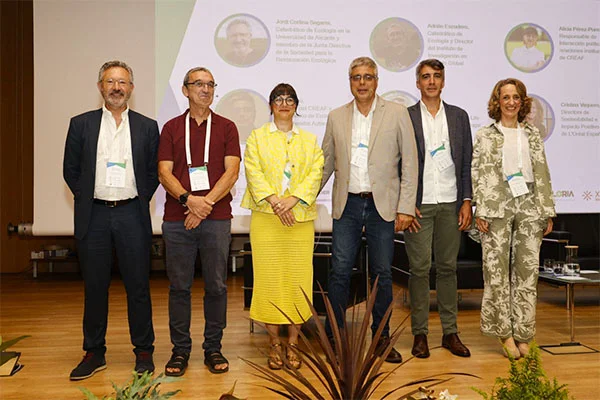
Second session
The second session focused on the topic «The Double Materiality Matrix and its Application in Sustainability Reports» and was moderated by Ms. Núria del Pozo, Legal Manager at the Fundación Empresa & Clima. The principle of double materiality and its application in sustainability reports was explained, highlighting the importance of considering social, environmental, and economic impacts in such reports.
The keynote speech was given by Mr. Carlos Moreno, Deputy Assistant Director General for Accounting Standardization and Accounting Techniques at the Institute of Accounting and Account Auditing (ICAC). This was followed by a round table discussion with the participation of Ms. Inés García-Pintos, lecturer and senior advisor on sustainability; Mr. Ignacio Hernández-Ranera, sustainability consultant at 17ODS; Dr. María Mora, Board Member of XBRL International and Head of Innovation at Fujitsu; and Ms. Elisa Pirisi, head of the GRI Reporting Service.
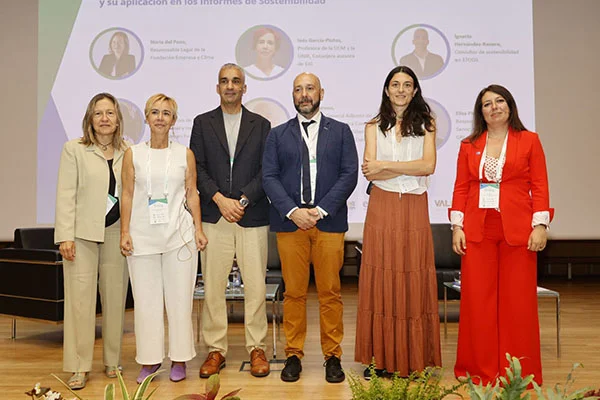
Third session
The third session addressed the topic «How does climate change affect people’s health?», moderated by Ms. Núria del Pozo, focusing on the threat that climate change poses to global health. The possible impacts of climate change on people’s health were discussed, including respiratory diseases, heat waves, and other extreme phenomena.
Ms. María Walavender, a researcher on climate change and health at Lancet Countdown, gave the keynote speech. There was also a round table discussion with the participation of Dr. Julio Díaz, co-director of the Climate Change, Health and Urban Environment Unit at the Carlos III Health Institute; Ms. Isis Riquelme, CEO/Founder of Chucaw, social innovator, environmental educator, and socio-environmental activist; and Dr. Adonina Tardón, professor emeritus of Preventive Medicine and Public Health at the University of Oviedo.
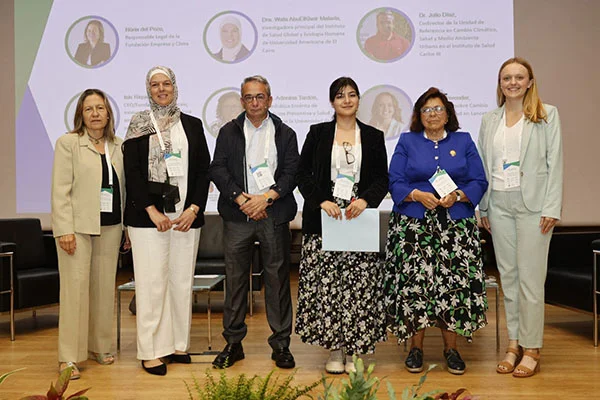
Fourth session
Mr. Miquel Rovira, Director of Sustainability at Eurecat, moderated the fourth session entitled «Nature-Based Solutions and their Industrial Applications». It focused on nature-based solutions to address challenges such as water scarcity, natural disasters, and climate change. He highlighted that healthy ecosystems provide benefits such as reduced emissions, guaranteed water resources, and food security.
The keynote speech was given by Mr. Carles Ibáñez, Director of the Center for Climate Resilience and Senior Researcher at the Technological Unit for Climate Solutions and Ecosystem Services at EURECAT. This was followed by a round table discussion with Ms. Gloria Calderón Peña, coordinator of the ECDBC Territorial Implementation Project and SolNatura at Fondo Acción; Mr. Eduardo de Miguel, director of the Global Nature Foundation; Ms. Juliana Mutis, general director and founder of minkadev; and Mr. Antonio Pérez-Lepe, manager of Innovation and Technology at the Repsol Foundation.
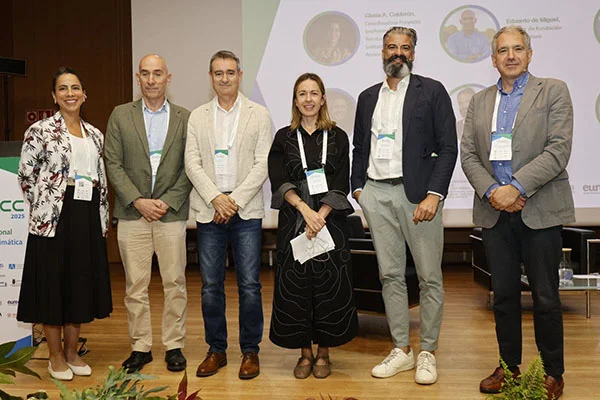
Fifth session
The fifth session of the conference, moderated by Mr. Ángel Suárez Paraja, CEO of EcoDualba Gestión, S. L., focused on «Hydrogen and its Applications in Industry». During this session, the crucial role of hydrogen in the energy transition and its capacity to reduce emissions was discussed. It was highlighted that fuel cells can be produced from various sources, such as water and biomass.
The keynote speech was given by Mr. Bamidele Adebisi MBE, Professor at Manchester Metropolitan University and Director of the African Hydrogen Association Trade Council. This was followed by a round table discussion with contributions from Mr. Héctor Carbonell, Director of H2 and Energy Transition for Southern Europe at Carburos Metálicos; Ms. Adriana Mantilla, senior geophysicist at Xcalibur Smart Mapping; Mr. Jorge Palomar, director of Hydrogen Development at Iberdrola; and Ms. Maribel Rodríguez, director of Hydrogen at Repsol.
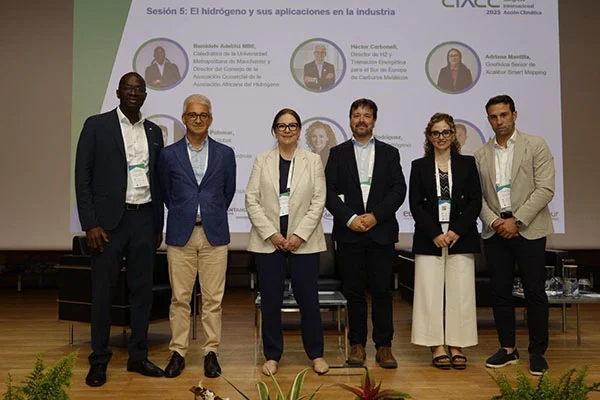
Sixth session
The sixth and final session of the 2025 International Climate Action Congress, entitled «Energy Efficiency and Sustainable Construction», was moderated by Central Lechera Asturiana Sociedad Agraria de Transformación. During this session, the importance of sustainable construction in reducing the environmental impact of buildings and contributing to the fight against climate change was discussed. It was highlighted that sustainable construction not only offers comfort and safety, but also reduces the impact on the environment throughout the building’s entire life cycle.
The keynote speech was given by Mr. Desmond Wheatley, President and CEO of the Board of Directors of Beam Global. The round table was attended by Mr. Ignasi Cubiñá, Director of Strategy and Sustainability (CSSO), partner and member of the Board of Directors of Grupo Construcía. Co-founder of Eco Intelligent Growth; Mr. Miguel Ángel Gallardo, Director of the Spain and Portugal Business Unit at ROCKWOOL Peninsular; Mr. Antonio García Martínez, PhD, architect and researcher at the University of Seville; and Mr. Jordi Portabella, Director of Sustainability at Fútbol Club Barcelona.
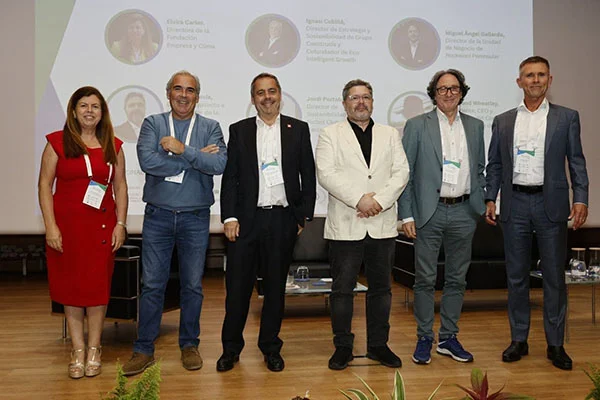
Closing of CIACC 2025
The closing ceremony was attended by Elvira Carles, director of the Fundación Privada Empresa y Clima; Roberto Media, Minister of Development, Housing, Land Planning and Environment of Cantabria; and Rubén Calderón, rector of UNEATLANTICO.
The Fundación Empresa y Clima has already proposed June 30, July 1 and 2, 2026 as the dates for the next edition of the congress.
